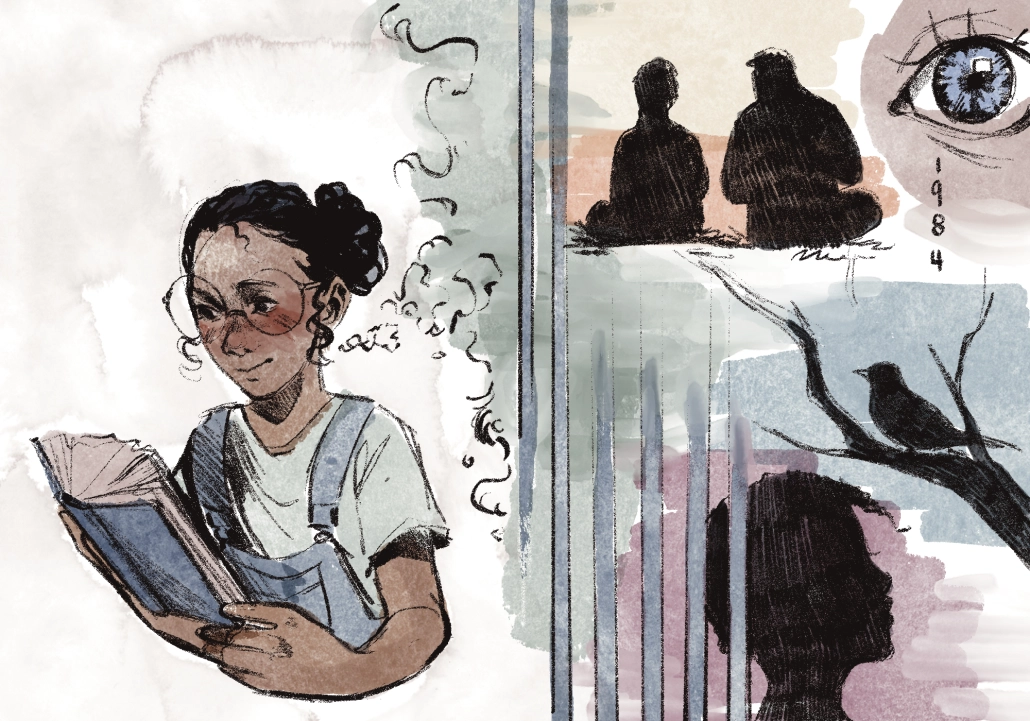I RECKON
Book bans will disarm the next generation of activists
Say goodbye to a better future!
Say goodbye to a better future!


I used to be a bit right-wing, but books saved me.
Alright, maybe right-wing is the wrong way to describe myself, especially since the term has transformed into something much more intense over the years. And maybe it’s a slight stretch to say that books alone “saved me” from a life spent in MAGA hats and unironically quoting Ronald Reagan.
Let’s just say I was a conservative. What can I say, I went to a Vietnamese Catholic Saturday and Sunday school for most of my childhood where Fox News was on the kitchen television every day, and I grew up learning how to shoot a BB gun, raise chickens and not question a bit of the history I was taught.
Still, I would be remiss if I didn’t praise the impact that books have had on my life — the things I’ve read influence this column, my work and my life. Books have made me the activist that I hope I am today.
But students in school districts all across the South may never realize their potential to impact change like I did. Sweeping book bans and “parental rights” efforts have put too much power into the hands of a tiny few — both peers and parents alike.
In South Carolina, a teacher was barred from assigning TaNehisi Coates’ “Between the World and Me” in her advanced English class soon after some of her own students reported that they felt uncomfortable being taught the book. Written as a letter to his son, the book offers a first-hand account of the reality of living as a Black man in the United States.
From 2021 to 2022, 60% of the books that were challenged were done so by just 11 people, including one woman in Virginia who challenged herself to take issue with one book a week.
These folks are straight out of the loony bin, but I think their behavior is brought up too much in the discussion around book bans. Too little are we thinking about the kids who sought refuge in these books, and who have since had those books ripped away from them.
These are kids whose identities and aspirations may lead them to know that the world is so much bigger than their classrooms, but who will never get the keys to leave the cage that school districts and state legislatures have put them in.
Book bans are nothing new, and the list of controversial and divisive titles that have turned nations on their head is long and storied. Upton Sinclair’s “The Jungle” revolutionized the way we saw the meatpacking industry and the lives of the working class — but it was also denounced as “un-American libel” by conservative press when it was first published. Even “1984” by George Orwell, which has found a modern foothold with Russian activists rallying against their country’s repression, was banned in the 1980s in Florida.
Like Cesar A. Cruz said about art, a book should comfort the disturbed and disturb the comforted. For the young students who have experienced book bans and have had literature that reflects their identities and experiences taken from their local libraries, they will remain disturbed without any respite.
They’ll sink into the crowd and get caught up in the systems and institutions designed to keep them down because they don’t have any literary examples to light the way to a better future. They won’t challenge the systems they know because they’ve never encountered a book that challenges them.
As bleak as that picture is, I urge you to continue to pay attention to news coverage about the book bans in one county or another. Weep about how primary school education in the South has gone to the dogs. But then start going to your local school district meetings and check out your local library.
Start paying attention to the threats to books in your area, and don’t let this literary backsliding bleed beyond Southern states. And if you find that your home turf is safe, respond to calls to action from teachers, students and book-loving activists in communities across the South, whether by donating banned books or sharing resources so they can access restricted titles.
Of all the scary doomsday scenarios I can think of, a world without books is possibly the scariest because we’ll have no leaders that have been inspired to take up the mantle because they’ve read a book that opened up their minds. There will be no more Clarisse McClellans, just Captain Beattys next time.
Quynh Anh Nguyen is a senior writing about the implications of current Southern political events. Her column, “I Reckon,” runs every other Wednesday.
We are the only independent newspaper here at USC, run at every level by students. That means we aren’t tied down by any other interests but those of readers like you: the students, faculty, staff and South Central residents that together make up the USC community.
Independence is a double-edged sword: We have a unique lens into the University’s actions and policies, and can hold powerful figures accountable when others cannot. But that also means our budget is severely limited. We’re already spread thin as we compensate the writers, photographers, artists, designers and editors whose incredible work you see in our daily paper; as we work to revamp and expand our digital presence, we now have additional staff making podcasts, videos, webpages, our first ever magazine and social media content, who are at risk of being unable to receive the compensation they deserve.
We are therefore indebted to readers like you, who, by supporting us, help keep our paper daily (we are the only remaining college paper on the West Coast that prints every single weekday), independent, free and widely accessible.
Please consider supporting us. Even $1 goes a long way in supporting our work; if you are able, you can also support us with monthly, or even annual, donations. Thank you.
This site uses cookies. By continuing to browse the site, you are agreeing to our use of cookies.
Accept settingsDo Not AcceptWe may request cookies to be set on your device. We use cookies to let us know when you visit our websites, how you interact with us, to enrich your user experience, and to customize your relationship with our website.
Click on the different category headings to find out more. You can also change some of your preferences. Note that blocking some types of cookies may impact your experience on our websites and the services we are able to offer.
These cookies are strictly necessary to provide you with services available through our website and to use some of its features.
Because these cookies are strictly necessary to deliver the website, refusing them will have impact how our site functions. You always can block or delete cookies by changing your browser settings and force blocking all cookies on this website. But this will always prompt you to accept/refuse cookies when revisiting our site.
We fully respect if you want to refuse cookies but to avoid asking you again and again kindly allow us to store a cookie for that. You are free to opt out any time or opt in for other cookies to get a better experience. If you refuse cookies we will remove all set cookies in our domain.
We provide you with a list of stored cookies on your computer in our domain so you can check what we stored. Due to security reasons we are not able to show or modify cookies from other domains. You can check these in your browser security settings.
These cookies collect information that is used either in aggregate form to help us understand how our website is being used or how effective our marketing campaigns are, or to help us customize our website and application for you in order to enhance your experience.
If you do not want that we track your visit to our site you can disable tracking in your browser here:
We also use different external services like Google Webfonts, Google Maps, and external Video providers. Since these providers may collect personal data like your IP address we allow you to block them here. Please be aware that this might heavily reduce the functionality and appearance of our site. Changes will take effect once you reload the page.
Google Webfont Settings:
Google Map Settings:
Google reCaptcha Settings:
Vimeo and Youtube video embeds:
The following cookies are also needed - You can choose if you want to allow them:
